June 2025 Pew Research Center Surveys on Israel
Divided at home and condemned abroad, public opinion of Israel sinks in response to war and domestic politics.

Divided at home and condemned abroad, public opinion of Israel sinks in response to war and domestic politics.
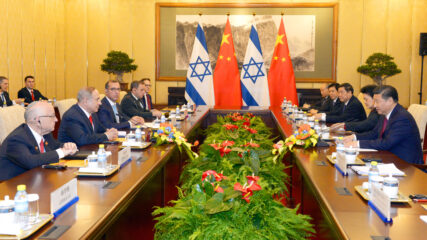
Until the 1990s, when Israel’s increased engagement with Asia notably expanded, her relations with China, India and Japan were limited for three broad reasons.

The clash of great powers to control the Middle East, particularly between the U.S. and the U.S.S.R., neither began after World War II nor ended with the demise of the Soviet Union in 1991. Today, China, the U.S., Russia and Middle Eastern regional powers vie to influence everyday politics and resources.
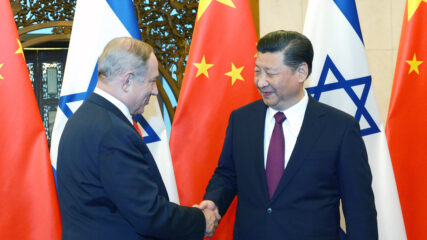
This article offers assessments of China in a clear-eyed and non-polemical fashion. It offers not an apology but an explanation for why China, having suffered a century of humiliation by external powers in the 19th century, is focused on re-establishing its role in the world – a role it believes its global economic weight entitles it to have. The Chinese response to the coronavirus is a vivid reminder of the fear that constrains honest discussion or reporting or intellectual development in that vast country.
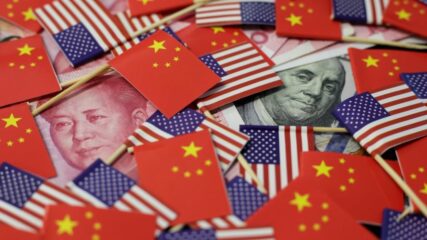
A series of “volcanic” eruptions are reported around the world: “trade war,” mutual imposition of tariffs, sanctions on companies, military signaling in the South China Sea, summits between leaders, and temporary “ceasefires.” All are manifestations of the historic clash between the “tectonic plates” of the United States of America and the People’s Republic of China. Like the processes that shaped the earth, the collision will shape the landscape for future generations: politically, economically and militarily. Israel has a marginal and secondary role in this dynamic, but the shockwaves reach its shores and present complex challenges to its policy and national security.
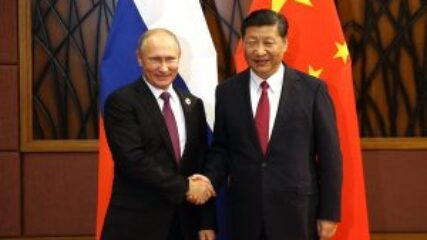
Odds are that China and Russia will prove to be long-term US rivals. However, it may just as well be that their alliance will prove to be more tactical than strategic, with the China-Russia relationship resembling US-Chinese ties: cooperation in an environment of divergence rather than convergence.

In January 2019, about two weeks before India’s Republic Day, Israel’s national security adviser, Meir Ben-Shabbat, flew to New Delhi and met Prime Minister Narendra Modi. While such consultations have been routine for the past two decades, the Israeli official chose the direct Air India flight from Tel Aviv, a new flight connection that could only be established because of an unprecedented permit for Israel-bound flights to fly over Saudi airspace. The small incident highlights the distance that India and Israel have traveled since the normalization of diplomatic relations in 1992.

In the past few years, Israel has begun to tilt toward the East. While Israel’s growing relationship with China, in particular, has gained widespread attention in recent years, little attention has been paid to Israel’s relationship with the other Asian economic superpower—Japan.
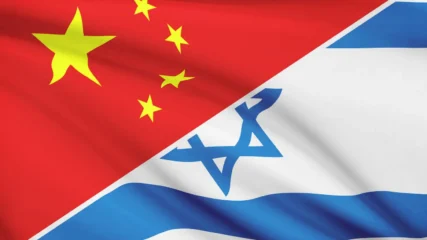
Over recent weeks, a serious debate has taken place on the pages of Mosaic Magazine on Israeli-Chinese relations. First came a detailed study by Arthur Herman, a respected scholar on aspects of Israeli foreign policy. Then came stern warnings from one of America’s best “China hands,” Dan Blumenthal, that “Israel’s Embrace of China is Sorely Misguided,” and from a strong and steady friend, Elliott Abrams, who wrote that “Israel mustn’t let its economic relationship with China threaten its political relationship with America.”

In the past decade, relations between Israel and China have become closer, following a decision in Jerusalem to diversify and expand Israel’s ties with emerging powers and countries that do not belong to the European Union and are less identified with the American coalition. The visit to Israel by China’s vice president is evidence of the warming of relations between the two countries.

On July 6, 2018, the first tariffs imposed by the United States and China on one another following the American initiative to reduce its trade deficit with China took effect. Prior to that, the US imposed tariffs on steel and aluminum from the European Union, Mexico, and Canada, which responded with their own tariffs.